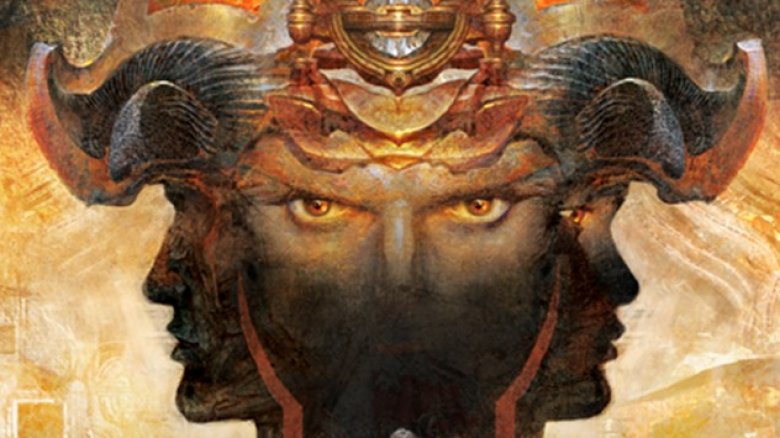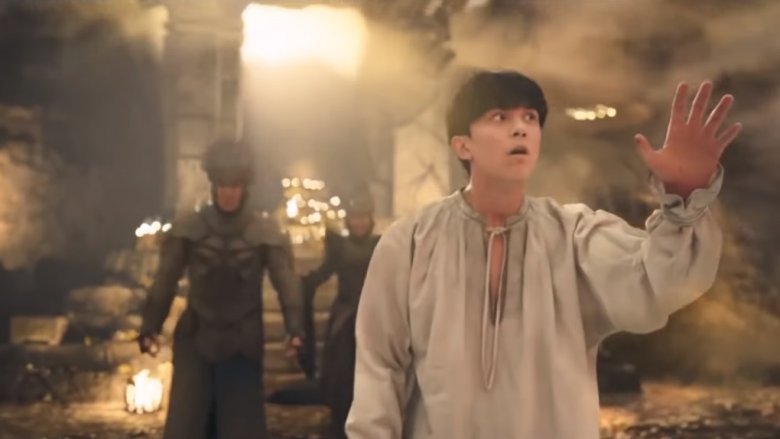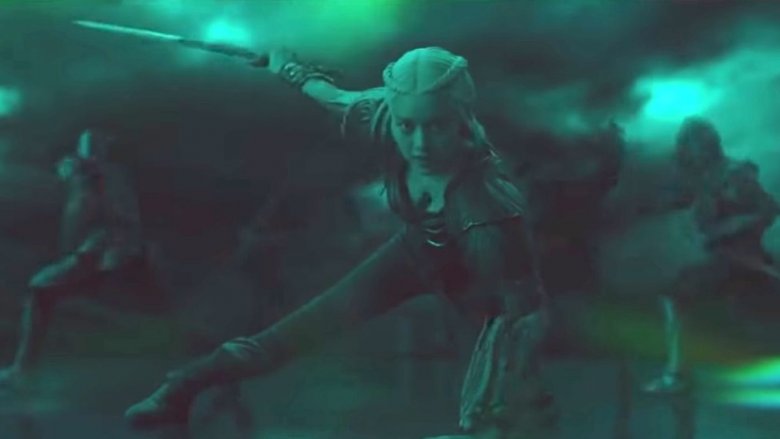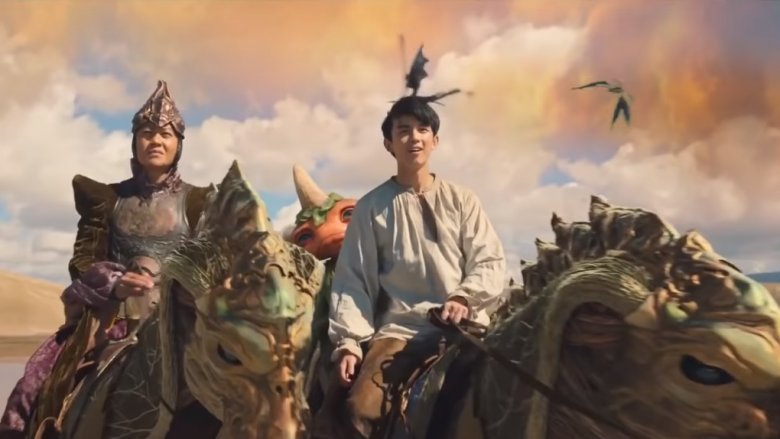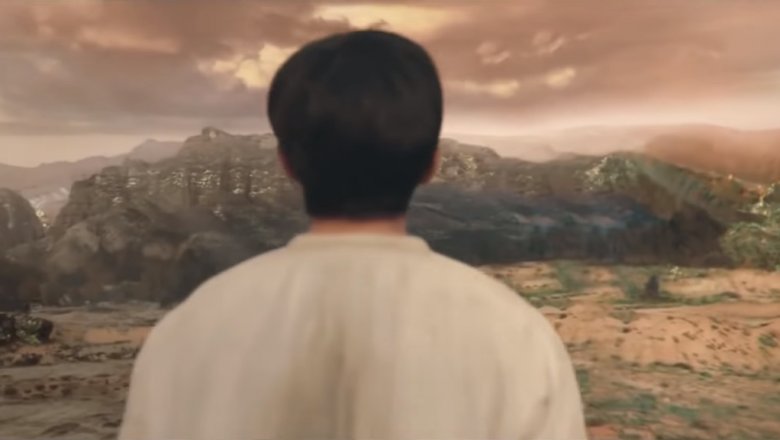Why China's Most Expensive Movie Ever Bombed At The Box Office
To a certain set of moviegoers, box office bombs hold a lot of appeal. Not audience appeal, of course — they wouldn't be called bombs if people actually wanted to see them. No, the appeal is in the failure of the movies themselves, and the stories of how so many talented professionals can come together to produce films that completely fail on a massive scale. It's satisfying to chuckle from the sidelines — you may have problems, but at least you didn't lose $100 million over the course of a single weekend.
In 2018, the North American box office has had its share of high-profile bombs. There's been Solo, the worst-performing Star Wars movie in the history of Star Wars, and Skyscraper, the 54th movie Dwayne Johnson's made this year. But nothing in the 2018 movie marketplace even comes close to the disastrous performance of the Chinese film Asura.
How bad could it really be? We'd tell you to see for yourself, but even if you lived in Beijing and wanted to watch Asura after its opening weekend, you couldn't. Made with a reported budget of $113 million, Asura debuted to a $7.1 million take at the box office. Before the weekend was over, the movie had been pulled from theaters — a bomb that self-destructed. Let's investigate the blast zone, and figure out why China's most expensive movie ever bombed so hard at the box office.
What is Asura?
If you don't live in China and haven't been following this story, you almost definitely don't know what Asura is. An adaptation of ancient Tibetan legends and Buddhist mythology, the movie follows a young man who discovers he's destined to save a heavenly dimension known as Tian, which is under attack by a three-headed king named Asura. Over the course of his journey, he discovers he is the reincarnation of one of Asura's heads, which he lost 100 years ago during a previous attempt at invading Tian.
But ignore the specifics, weird as they may seem. Stripped down to its basics, Asura is just a story of a hero's journey — one that was pitched as the start of a trilogy. Does that still have a chance of happening? Not according to the experts.
"This is a particularly bad situation," said Stanley Rosen, an academic expert on Chinese politics and film, speaking to the South China Morning Post. "Unless they can somehow put the film back in theaters, re-edit it and do a better job with it, there won't be any sequels."
Odd as it may seem, that "re-edit and do better" strategy is exactly what Asura's producers have said they plan to do — and they've got a pretty wild reason for thinking it might work.
Listen up y'all, this was sabotage
After Asura was pulled from theaters, the blame game began — and it got really intriguing, really fast. Instead of criticizing their own craftsmanship or sales tactics, the producers behind Asura pinned the blame for the movie's failure on an alleged conspiracy.
According to a breakdown by The Hollywood Reporter, the producers are accusing China's most prominent film review aggregating websites of letting users tank the movie's rating with illegitimate reviews.
There are three sites in China that work as the equivalent of the English-language Rotten Tomatoes and Metacritic: Tiao Piao Piao, Maoyan, and Douban. While one would expect the average review scores across the three sites to be relatively consistent, the Asura producers point out a curious discrepancy.
Essentially, the early average score for Asura on Tiao Piao Piao was much more favorable than it was for the other two sites, notching a score of 8.4/10 there as opposed to a 4.9/10 and 3.1/10 on Maoyan and Douban. What explains that discrepancy? We don't know — but the people behind Asura are convinced that their movie is the victim of a focused, malicious attack.
Attack of the water army
The Asura producers aren't the first to cry conspiracy. Multiple film studios in China have alleged that their movies were targeted with illegitimate negative reviews, so much so that there's even a slang term for the people who supposedly do this stuff. In China, these weaponized writers are known as shuijun, which translates to English as "water army" — a term stemming from the idea of "flooding" sites with fake reviews.
After announcing they were pulling it from theaters, Asura's producers began pressing the claim that their movie was the victim of an unusually brutal shuijun assault. In particular, they specifically called out the site Maoyan, disputing the validity of its review process and blaming the company for allowing shuijun attacks to proceed without punishment. Specifically, the producers claim that they discovered a large number of 1/10 reviews from suspicious-looking users on the site being posted immediately after the film hit theaters. With this as their evidence, the producers are claiming the existence of nothing less than a coordinated plot against Asura, saying in an official statement that "whoever is behind this is dirty, stupid and ridiculous."
Of course, illegitimate reviews can also work in the opposite direction, giving positive buzz to a movie that doesn't deserve it. And this ain't just a Chinese thing — if you want to see some suspicious user ratings, take a look at the Rotten Tomatoes user scores for John Travolta's Gotti.
Yanked from theaters
Rather than cut their losses and ride out the storm, making back as much money as they could in the process, the Asura filmmakers decided to snatch their movie back out of theaters and run away.
Prior to the retreat of Asura, only a few movies in China had gotten the ol' vaudeville hook. In 2012, Quentin Tarantino's Django Unchained was unexpectedly pulled from Chinese theaters literally minutes after being released, but that was only done for the sake of censorship, and Django returned to theaters in a matter of weeks after edits were made to its content. Asura's situation is entirely different — it was pulled by the film's own producers, for the drastic purposes of editing the movie to somehow make it better. With that in mind, it doesn't seem like Asura will be back to finish its run as quickly as Django was. To appreciably raise the movie's quality through editing would take much more time and consideration than just snipping out scenes of blood and nudity — likely months, as opposed to weeks.
World-class SFX
One of Asura's biggest attempted innovations is its larger-than-usual focus on special effects. This might seem unusual to American moviegoers, who are used to seeing top-tier, state-of-the-art special effects in their films as a matter of course, but in the past, Chinese-produced movies typically haven't had as much money pumped into them, with it still being relatively rare for a movie produced there to cost more than $100 million. (Meanwhile, Asura's reported budget of $113 million would barely cover a mid-tier Marvel movie's marketing costs.) As a result, Chinese movies often have special effects that look embarrassingly cheap.
Asura aimed to break that mold. The movie contains over 2400 special effects shots throughout its 141-minute runtime, and that stuff is far from cheap. It's one of the reasons why American movies are such big business all around the world: Unlike just about every other nation, we go completely Texas with movies' SFX, devoting incredible amounts of money to making sure a purple space monster can realistically cry.
For Asura, it seems no expense was spared in order to bring the movie's effects to the standard set by American movies. That included hiring in-demand, award-winning Hollywood talent, from Deadpool and Furious 7's Charlie Iturriaga as the VFX supervisor to Academy Award-winning costume designer Ngila Dickson, who previously worked on the Lord of the Rings. But while the money seems to have all ended up on screen, it doesn't appear to have been a good investment.
Middling marketing
Another one of Asura's problems is the sort of thing that could strike any movie, anywhere — a lack of effective marketing. Despite six years' worth of development and buildup, when it came time to actually sell Asura to potential audiences, it looks like the ball got dropped at a critical moment.
At least, that's one claim that's been circulating, stemming from Chinese market analysts. "Based on our tracking, prerelease market heat for this movie was quite low — below average," said a representative of Beijing-based showbiz market research firm Fankink, speaking to The Hollywood Reporter on the Monday after the movie had been pulled from theaters.
Regardless of whether or not that's an accurate assessment of the situation, Asura is undeniably well-known now. In the wake of its high-profile failure, the movie has a reputation — and it's not a good one. Asura is not notorious for being a bad movie, which might in some way give it a chance to ride a wave of "so bad it's good" curiosity. No, instead it has a reputation — a worldwide reputation — as a movie almost nobody wanted to see.
Untested director
What else could have gone wrong here? While the autopsy on Asura's crash landing at the box office is still unfolding, we can identify some factors that may have contributed to the movie's poor reception. For one thing, director Peng Zhang is an untested quantity. Though he's been a stunt coordinator for many Hollywood productions, including The Last Samurai, Rush Hour 3, and Wonder Woman, Asura is his first project as director — ever.
Think about that for a second — what's purported to be the most expensive film ever made in the history of China was directed by a person who had never directed a movie before in their life. While Zhang's résumé does include second unit or assistant directing work on two films from 2013, those credits seem to refer exclusively to action scenes, not an unfolding epic intended to be made on the same scale of craft and care as The Lord of the Rings. We're not saying Asura's failure is Zhang's fault — we're just pointing out, pretty reasonably, that he seems like an incredibly strange choice to head up such an unprecedentedly expensive, high-stakes production.
Shrug, yawn, pass
Apparently, $7.1 million in ticket sales doesn't add up to all that many people, and as a result, a lot about what's supposedly so bad about Asura is still a mystery to many.
Professional review outlets — not just English-language publications, but a majority of mainstream ones — didn't get a chance to review Asura before it left theaters. In the days after its release, journalists were openly calling for people who had actually seen the movie to get in touch with them, presumably in an effort to pin down what exactly was so loathsome about this particular fantasy movie.
Not only do we not know what the producers are planning to change about the movie in order to revive it as a viable force at the box office, we also have no idea of what they should change. Well, unless they're just going to edit out the character that looks like a horned wad of Silly Putty. We've got no idea what that character's deal is, but he definitely isn't doing a great job of making us want to see the movie, you know what we mean?
Re-edit and retry
Would re-editing the movie have any chance of making things right for Asura, and get the proposed trilogy-starter back on the road to profitability? Maybe — but few people outside of the production seem to think so.
"Films are among the most perishable of products — a one shot thing," said James Li, the founder of the Fankink market research firm, speaking to The Hollywood Reporter. "Unlike some consumer categories, there is very little chance to resurrect a movie once it is already out on the market."
In a way, it's remarkable how much the Asura producers may have screwed themselves over by pulling the movie from theaters in a panic. Had they rode things out, they probably could have doubled their earnings, or at least gotten close. $14.2 million is drastically better than $7.1 million, after all. It's still terrible, but hey, maybe one less person gets fired then, y'know? Instead, they cut their losses in a matter of hours, and now have to figure out a way to make their roundly-rejected movie into something that actually seems like it's worth seeing.
Of course, that morbid curiosity factor, combined with some eye-of-the-needle marketing and sheer tyranny of will, honestly might help Asura go over the top, given luck and a long enough timeline. At least, that's what one anonymous film executive in the US thinks, according to THR.
"If there's anywhere I could see someone figuring out how to pull this off," the exec said, "It's China."
The flop of a lifetime?
While a clear narrative has emerged for Asura's rise, fall, and theoretical redemption, there's still a lot about this story that's wrapped up in the fog of war. Namely — how sure are we that this movie actually cost $113 million? Some people have doubts.
Sure, the marketing materials for the movie say it sported a record-high budget. And yes, the Chinese state media has run with the number as well. But fellow studios and peers in the film industry have raised some doubts, with most of China's blockbusters to date only costing about half of what Asura supposedly did.
If Asura didn't actually cost as much as has been reported, then maybe that made the decision on the producers' part to pull it that much easier. That changes the risk calculus. Maybe there was less to lose here then we're being led to believe.
Or maybe not! The producers and their shuijun claims are persuasive too. Maybe it's best that we keep some distance from this story, and focus on the one facet of it that we know without a doubt to be true — that all of this high-profile failing and flailing is extremely funny to see unfold.
